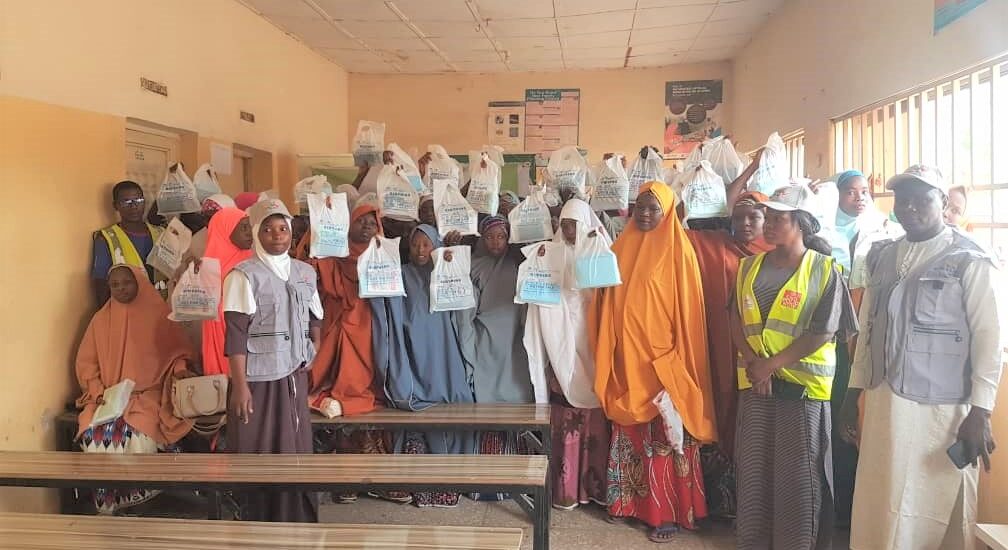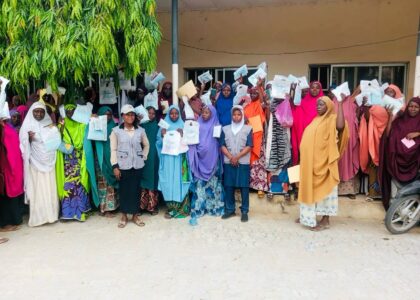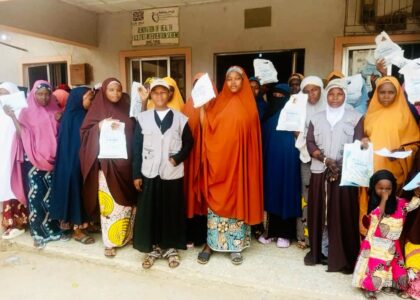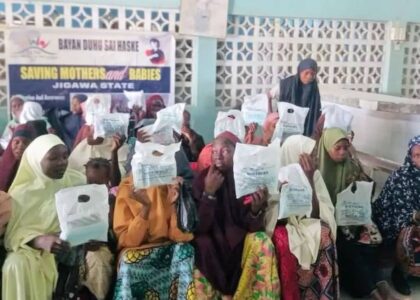The Jigawa Maternal and Child Health (MNCH) Project, a collaborative effort between SLNI, the TY Danjuma Foundation and the Rotary club, was initiated on 22nd April, 2024, with the primary goal of combating maternal and child mortality in Jigawa State, Nigeria. This report aims to provide an extensive overview of the program’s activities, challenges encountered, recommendations formulated, and overall conclusions drawn from its implementation.
PROGRAM ACTIVITIES
Maternal Education Session and Distribution of Birthing Kits
The program commenced with a series of informative sessions carefully designed to cover critical aspects of Maternal Newborn and Child Health (MNCH). These sessions served as platforms for disseminating crucial information on prenatal and postnatal care, family planning, nutrition, hygiene practices, and the importance of routine immunizations. Sixty-three (63) pregnant women,
representing various communities across Dutse, Jigawa State, were provided with birthing kits meticulously crafted to ensure safe deliveries and adequate postnatal care. Each birthing kit contained essential items such as antiseptic soap, examination gloves, underlay pads, mucus extractors, umbilical cord strings, surgical blades, surgical gloves, and pieces of gauze. The provision of these kits aimed to empower expectant mothers with the necessary resources and support during childbirth, thereby reducing the risk of complications and promoting positive birth outcomes.
MNCH Educational Session with Fathers
Moreover, the program emphasized the active involvement of fathers in discussions and educational sessions, recognizing their indispensable role in promoting maternal and child wellbeing. Thirty-two (32) Fathers were engaged in dialogues focusing on their responsibilities in supporting their partners throughout pregnancy, childbirth, and the postnatal period. Topics covered included family planning, maternal nutrition, Kangaroo Mother Care (KMC), Diaper changing and the identification and management of pregnancy-related complications. This inclusive approach aimed to foster a supportive environment within families, encouraging shared decision-making and mutual support in matters concerning maternal and child health.
Ultrasound Scan Session
In addition to educational sessions and the distribution of birthing kits, the program facilitated access to essential healthcare services for pregnant women, particularly those with preexisting complications. Twenty-three pregnant women identified as high-risk cases received referrals for free ultrasound scans at Sambo Hospital, as the primary healthcare center lacked the necessary facilities to conduct such scans. This necessitated referrals to facilities equipped with the requisite ultrasound equipment, posing challenges for expectant mothers who had to cover a distance to access these facilities. This logistical challenge hindered some women from receiving timely and optimal healthcare during pregnancy, highlighting the need for improved access to essential services.
CHALLENGES
The primary challenge encountered during program implementation was the lack of adequate facilities at primary healthcare centers to conduct ultrasound scans for expectant mothers. This resulted in referrals to distant facilities with the necessary equipment, posing logistical challenges and hindering timely access to essential healthcare services.
RECOMMENDATIONS
To address the challenge of limited access to ultrasound scans, it is recommended to invest in upgrading the infrastructure and facilities at primary healthcare centers to enable the provision of comprehensive maternal and child health services, including prenatal diagnostic services. This may involve allocating resources for the procurement of ultrasound equipment and the training of healthcare personnel to operate such equipment effectively. Additionally, efforts should be made to decentralize healthcare services and establish satellite clinics equipped with ultrasound facilities in underserved areas to improve accessibility and reduce the burden on pregnant women.
CONCLUSION
In conclusion, the Jigawa MNCH Project has made significant strides towards achieving its objectives of improving maternal and child health outcomes in the region, reaching a total of 95 expectant parents with Sixty-three (63) expectant mothers and Thirty-two (32) expectant fathers. The program’s comprehensive approach, which encompasses education, provision of essential resources, and access to healthcare services, has contributed to raising awareness and empowering expectant mothers and their families to make informed decisions regarding their health. However, challenges such as limited access to essential services, particularly ultrasound scans, highlight the need for continued efforts and investment in strengthening healthcare infrastructure and service delivery mechanisms. Moving forward, sustained collaboration and advocacy will be essential to address these challenges and ensure the continued improvement of maternal and child health outcomes in Jigawa State





